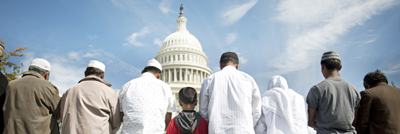
Nearly nine in 10 Muslim American voters pulled the lever for the Democratic candidate in the last two presidential elections, partly because of Republican policies and rhetoric that many considered anti-Muslim. In 2008, they also thought President Obama would usher in an era in which Muslims would be more accepted at home, and relations between America and the Islamic world would see improvement.
But this year, Muslim American support for President Obama shows signs of waning, which could be enough to affect the 2012 election in key swing states where a few thousand votes could have a big impact.
Several of those swing states — most notably Virginia, Michigan, Florida, Pennsylvania, Colorado, and Ohio — have enough Muslim voters to turn a tight race, experts say.
According to a poll of 500 Muslim American voters released Wednesday (Oct. 24) by the Council of American-Islamic Relations in Washington, 68 percent of Muslims said they would vote for President Obama, while 25 percent were undecided. The poll, which had a margin of error of plus or minus 5 percentage points, also found that 91 percent of Muslims intend to vote.
While Muslim Americans continue to place high importance on civil rights and foreign policy, the CAIR survey shows that they, like other Americans, have ranked the economy and jobs as their top concern, followed by education and health care.
“We came to this country for the opportunities it offered us, and we need to be focused on domestic issues that impact all Americans because now this is our home,” said New Yorker Zeba Iqbal, an Obama supporter and former executive director of the Council for the Advancement of Muslim Professionals.
But many Muslim Americans are disappointed with Obama on a range of issues, including his support for the Patriot Act, a counterterrorism law that that they say unfairly targets Muslims. Many Muslims are also upset about FBI sting operations against Muslims that civil rights activists say amount to entrapment.
In addition, many Muslim Americans were disappointed that Obama did not confront the New York City Police Department for allegedly spying on Muslim Americans in and around New York.
Overseas, Obama has stepped up drone attacks in Afghanistan and Pakistan that have killed dozens of civilians; Palestinians still have no independent state; and some Muslim critics say Washington still goes too easy on oppressive regimes in Saudi Arabia, Bahrain and other countries.
Most Muslim Americans believed the Iraq war was reckless, and have advocated for an American exit from Afghanistan. Many also believed America was right to to stay out of Iran's short-lived Green Revolution, where people are suspicious of the American government.
But in Syria, where strongman Bashar al-Assad’s forces have killed thousands in massacres and bombardments, more than two-thirds of Muslim Americans want the U.S. to be more supportive of anti-Assad rebels, according to the CAIR survey.
“The people on the ground are asking for it. People are dying there,” said Rashad Al-Dabbagh, a spokesman for the Syrian American Council, an advocacy group supporting the Syrian rebels. He said they want America to provide the rebels with heavy arms like anti-aircraft and anti-tank guns, and to fund rebel councils – two ideas that Romney floated during the third presidential debate.
While fewer Muslims are supporting Obama this year, Muslim support for Mitt Romney — at just 7 percent, according to the CAIR poll — is more than triple the 2.2 percent of Muslims who voted for GOP nominee John McCain in 2008.
“Muslims need tough love, not soft coddling to get over their illusions of Islamist fantasies,” said Ahmed Vanya, an engineer in San Jose, Calif.
Vanya fears that many Muslims won't give Romney a fair chance.
“Many Muslims are not going to be happy with the way Romney would handle the civil rights issues,” Vanya said. “Even if he follows exactly the same policies as Obama, he would be perceived as worse for the Muslims.”
Many Muslim Americans worry that the former Massachusetts governor will continue security policies they say disproportionately target them while embracing an George W. Bush-style foreign policy that will lead to more conflict with the Muslim world.
“The way Romney talks about eliminating extremism, like it can be done with a formula, shows that he doesn’t get it. And that’s dangerous,” said Ani Zonneveld, president of the Los Angeles-based Muslims for Progressive Values.
While Romney has not been explicitly anti-Islam or used the inflammatory rhetoric deployed by some Republicans, many Muslims say his failure to condemn such rhetoric, and his willingness to use words that alarm Americans, like “jihad” and “Islamic extremism,” shows he isn’t above exploiting fears about Muslims.
“Gov. Romney has not spoken out against this before the election, why would he do anything to minimize the Islamophobes after the election?” said Iqbal.
And for all the criticisms they have of Obama, Muslim Americans have found more than enough reasons to vote for him.
“To get one Osama bin Laden, our irresponsible President Bush destroyed a nation and a people,” said Mike Ghouse, a Muslim commentator in Texas, referring to the invasion of Iraq. “In contrast, President Obama got the guy with no collateral damage and no damage to bin Laden’s religion or the nation,” Ghouse said.
Some Muslim voters have taken a more pragmatic view: even though they may disagree with Romney and running mate Paul Ryan, they argue that being adversarial now would not be helpful if the GOP ticket wins the White House. That’s why Obama supporter Aziz Poonawalla introduced himself to Ryan at a Wisconsin apple farm several weeks ago.
“He needs to see and meet Muslim Americans,” Poonawalla wrote on the website Patheos.com, “(so) he has something/someone real to compare against the cartoon that his fellow Republicans have constructed about our community.”







